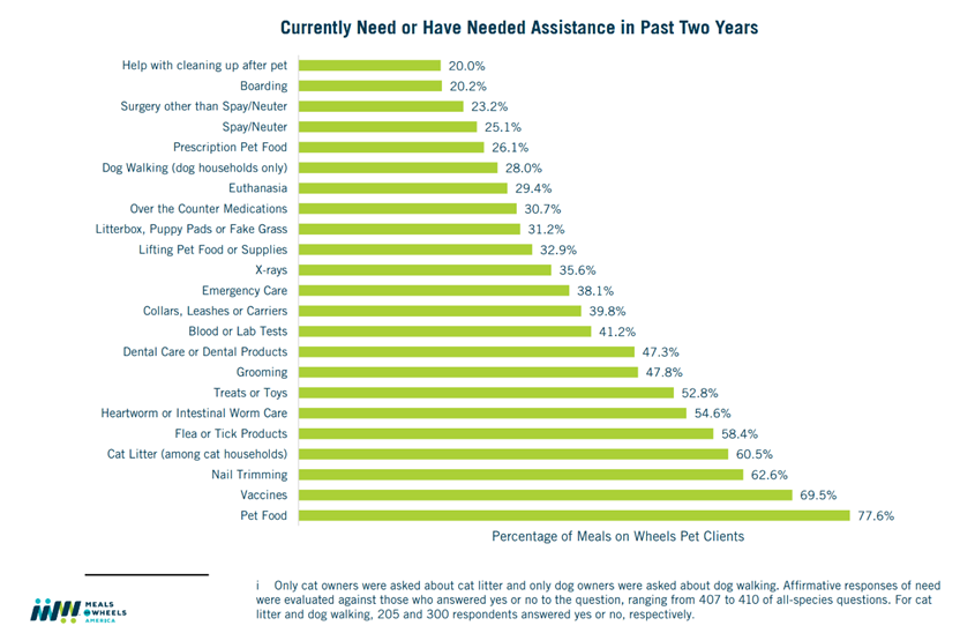Data-Rich Collaboration: A Gift to People & Pets

In 2020, Meals on Wheels America, with the support of PetSmart Charities, sought to gain deeper insights into the needs of clients with pets and explore expansion of pet programming to support their member programs nationwide. COVID-19 restrictions had amplified the social isolation of seniors, and their pets were now their closest – if not only — companions. With a mission of empowering local organizations to eliminate hunger and social isolation among seniors, Meals on Wheels America wanted to learn how their programs could best help people and their pets.
In 2019, PetSmart Charities granted funds to Meals on Wheels America in a unique three-year partnership to provide grants to local organizations for pet meals and veterinary care, and to fund research to gain a better understanding of the needs of seniors and the barriers they faced in caring for their pets. An extraordinary opportunity now existed to obtain these answers.
With Adisa’s deep expertise in community pet programming, veterinary care and research, we were honored to be involved in this unique and impactful assessment.
We sought out to secure answers and insights around:
- The actual needs of homebound Meals on Wheels clients and their pets.
- How this population’s needs compare to known data around access to veterinary care, specifically preventative care, sick care and emergency care and how cost and transportation barriers impact this population.
- The prevalence of who needed help with prescription pet food, boarding and overnight veterinary hospitalization, or help with other pet supplies.
- Loneliness and Social Isolation risk among this population and measure the bond with their companion animals, exploring what animals mean to homebound clients and whether clients have foregone their own care to provide for their pets.
The large research effort also explored existing pet programs in the Meals on Wheels network and sought to provide a road map for the efficient and effective expansion of pet programming.
How can Meals on Wheels America and other social service agencies focused on supporting food, housing and resource insecure bonded families provide lasting, impactful assistance – and how will this change conversations about people and pets in the future?
Why focus on pets?
While Meals on Wheels America has worked to bring resources to pet programs in the network in the past and do basic research at the program level, this project was a deep dive into hearing from clients with pets themselves as well as expert research into expansion of pet programming.
The companionship of pets has long been shown to reduce stress, lower blood pressure, increase social interaction and help encourage social activity. Anecdotal evidence of the positive influence of pets on isolated seniors was strong. Meals on Wheels America and PetSmart Charities could see that verified data would be a gateway to future programs with real impact, fulfilling the missions of both organizations for pets and people.
The principal Adisa consultants on this research project, Heather Cammisa and Dr. Jyothi Robertson, had a remarkable opportunity to take a deep look into the real lives of homebound seniors and get measurable data about their loving bond with their pets and the challenges they face caring for them.
Nearly 100% of pet-keeping Meals on Wheels clients surveyed agree: Pets reduce loneliness
Thirty-seven local Meals on Wheels member programs participated in the research. All of them already offered some form of pet programming for their local clients. Adisa sought out and hired a professional telephone research firm (because the right, gentle, approach here was critical). Over a six-week period, 415 senior clients were interviewed, providing personal insight into the importance of their pet in their life, their own loneliness and social isolation situation, what assistance they currently need or have needed within the past two years in caring for their pets, and difficulties they encountered caring for them.
While the public report includes many of the insights senior pet owners shared, a few of their answers reflected the full weight of their loneliness as well as the positive impact their pets — and Meals on Wheels — had on reducing it:
- 98.1% of clients with pets agreed with the statement that their pet “brings happiness to your life,” with 96.6% of clients indicating that their pet makes them feel less lonely.
- Forty-five percent of respondents classified as lonely according to a loneliness scale, and seven out of every ten of the clients who classified as lonely and at risk for social isolation lived alone.
Homebound seniors face significant challenges to keep pets fed and healthy.
To understand the exact barriers seniors faced, clients with pets were asked about the specific challenges they encountered as they cared for their companion animals.
Pet food is by far the greatest need among clients with pets. Three out of 4 clients needed food assistance at that moment or over the past two years. A quarter had needed or currently needed prescription pet food, which is far less commonly available in any food distribution channels, whether by humane societies or social service agencies working to help people feed their pets.
More than 60% of cat homes were in need of litter. Treats, toys, collars, leashes and carriers were also high on the list of needs.

One in two reported that other than the Meals on Wheels pet programming, they had no one else to help them with their pet’s needs.
Nearly 30% reported having foregone personal care to provide for their pets. For a population that may experience short hospital or rehabilitative stays, the need for boarding care is further clarified from the one in five clients who reported having a current or recent need in the past two years.
Of high importance in this project was ascertaining the frequency with which clients with pets could not access needed veterinary care and understand the barriers. Fully half of clients reported that they had been unable to obtain veterinary care when needed during the past two years. The primary barrier was cost with an important note that half of those reporting the inability to access care also reported that transportation to get the care was a barrier.
80% said that Meals on Wheels made it possible for them to keep their pet companion. It became clear that Meals on Wheels programs that provide pet care are a true lifeline for clients and their pets.
The impact of unified conversations about people and pets
The Meals on Wheels America/PetSmart Charities partnership is the first of its kind to undertake such targeted research.
This research helps bridge the historical gap between human social services and animal welfare. Partnerships like this help integrate the human-animal bond into the broader community fabric. They create more community and municipal conversations about policy reforms, programmatic integrations and help pull human-animal issues out of their separate funding and staffing buckets, for more meaningful impact.
We’re excited to see an influential national social services agency like Meals on Wheels America identify the human-animal bond as a key component to their clients thriving at home! We’re extremely grateful to the collaboration of these organizations putting quality research into the needs and challenges as they explore how to expand pet programming in their network – and we cannot wait until other components of our research are shared with potential to additionally inform and spur program development.
What new ways can social services agencies, animal welfare, and veterinary medicine work together? How do we create a memorandum of understanding to handle a unified future of fundraising and volunteer management? We look forward to approaching this new adventure with learning, respect and curiosity, to make the future for humans and animals the best it possibly can be.
Read the summary findings report here: https://www.mealsonwheelsamerica.org/docs/default-source/research/pet-programming-and-client-needs-assessment_final-report.pdf
